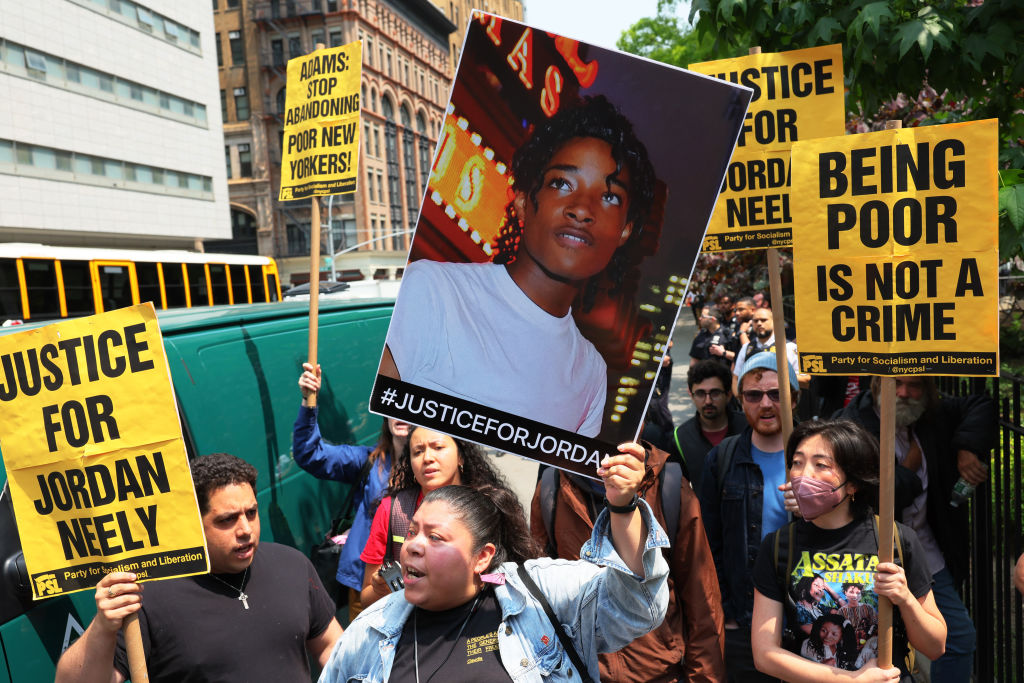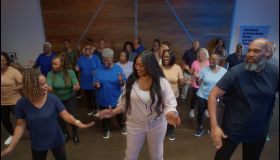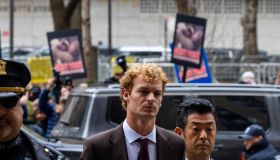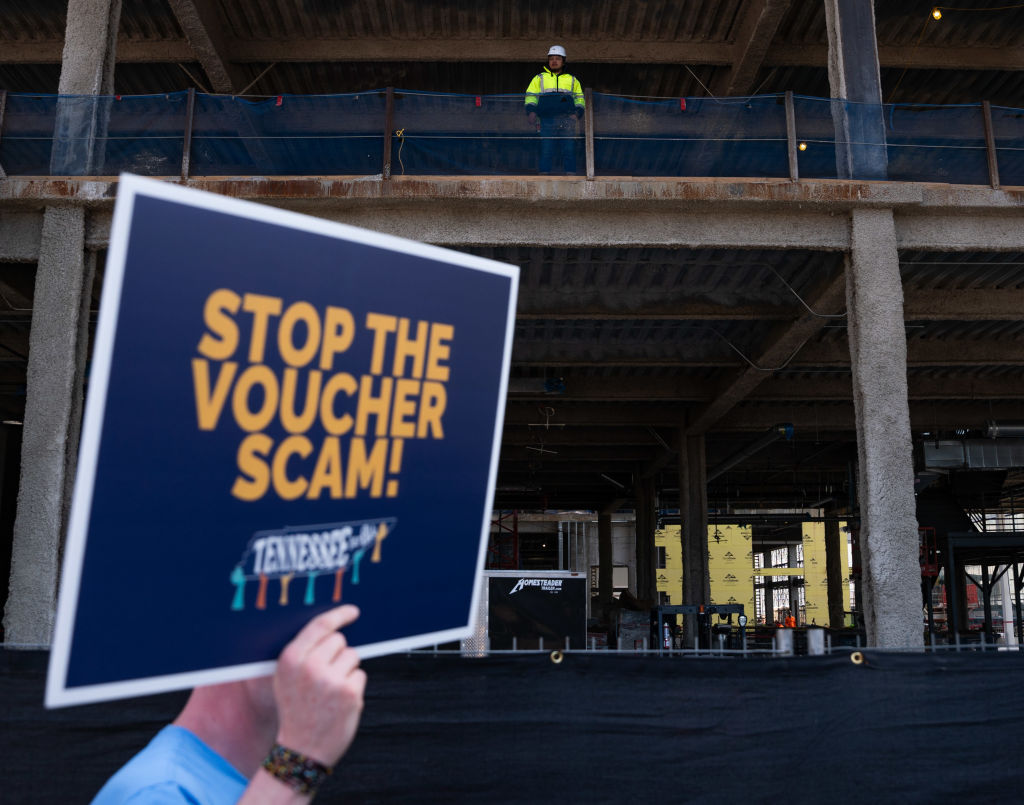Jordan Neely: The Lost Lives Of Young, Disabled Black Americans
Jordan Neely And The Lost Lives Of America’s Young, Black And Disabled

Supporters of Jordan Neely protest a rally in support of Daniel Penny on May 24, 2023, in New York City. | Source: Michael M. Santiago / Getty
We are disabled. We are Black. We are women, and just like Fannie Lou Hamer, “We are sick and tired of being sick and tired”. It is not solely our physical disabilities that exhaust us but constantly being forced to witness the murder of people who look like us. We see it on the news and when we log on to social media and listen to how people defend the unlawful murders and assault of Black disabled people like Jordan Neely. Like Neely, Hamer was poor, Black, and disabled, forced to battle the triple-headed monster of racism, classism, and ableism.
Hamer became disabled after contracting polio as a child, which left her with a permanent limp. She was nearly beaten to death by police officers in a Mississippi jail. Neely became disabled as the victim of a violent crime when his mother was murdered by a partner when he was just 14 years old. From then on, he was in the throes of depression, mental illness, and a system that criminalizes disabled people. Mental illnesses are disabilities, and disability has been historically whitewashed.
Though Black people are more likely to identify as disabled than their white counterparts, there has been an intentional erasure of their presence in disability representation. In the leadership of mental health advocacy nonprofits, policy think tanks, and organizations, why are they mostly white and non-disabled people? It’s due to racism, ableism, and a lack of intersectional approach to mental health care policy. It costs the lives of hundreds of disabled people like Neely, who was choked for 15 minutes on a New York City subway train.
A Black, unhoused man, Neely, was wrestled to the ground and placed in a chokehold by another New York City transit passenger, a white former Marine while displaying signs of mental illness. Neely’s crime? Yelling, throwing garbage and throwing his jacket to the ground, according to bystanders. Another man assisted the chokehold by holding Neely down. Police released the person who choked Neely. Last week, the assailant was finally charged with manslaughter, not murder.
Thus far, Neely’s murderer has raised $2.5 million for his legal defense and has received the support of prominent elected officials like Florida Governor Ron DeSantis. It’s reminiscent of the murder of Trayvon Martin when George Zimmerman raised $200,000 from supporters who believed a grown man gunning down an unarmed teenage boy was justifiable homicide. The difference is that his murder wasn’t captured on tape like Neely’s, but the bigoted sentiment remains the same. White men should be free to murder any Black person without consequence or retribution unjustly.
In March, a Black man, Irv Otieno, met a similar fate while in custody at a mental health facility in Virginia. He was smothered and suffocated by security guards and police while handcuffed. Otieno was pepper sprayed, held down by leg irons, and tackled by 5 or 6 jail deputies. Some of the mental health facility’s security guards watched and eventually joined in as Otieno lay motionless for 11 minutes, smothering to death.
These tragedies against Black disabled people continue throughout America, where disability is criminalized. In 2015, a Black woman, Natasha McKenna, was removed from the hospital where she was receiving psychiatric care and placed in solitary confinement in a Fairfax County, VA jail, where she deteriorated. As punishment for McKenna’s schizophrenic-related behaviors, she was extracted from her jail cell, held down by several male deputies, and repeatedly tased while begging for her life. McKenna died shortly thereafter. In 2021, a 10-year-old Black child with developmental disabilities was placed in a chokehold by a sheriff’s deputy in Jefferson Parish, Louisiana. According to his parents, the child was not killed but feared for his life.
Fear, unquestioned privilege, and power lead to more racial and ableist violence incidents, as we saw when Daniel Penny choked the life out of Neely. Though he could not know Neely’s history of mental illness or prior arrests, Penny’s attorneys issued a public statement using Neely’s disability to argue that their client is innocent and shouldn’t be charged with murder. Ironically, mental illness is used to condone killing innocent Black people but exonerate and save the lives of white murderers.
People with disabilities are often stigmatized, but it’s heightened for Black people. Johns Hopkins Bloomberg School of Public Health researchers found that 4 in 10 news stories linked mental health with violent behavior. In contrast, less than 5% of violence is directly connected to mental illness. To change the narrative, we must begin with disability justice, a framework for examining disability and ableism as they relate to other forms of oppression and identities such as race, class, and gender. The implications of NOT doing so are seen clearly in the nation’s policy choices, such as continuing to deploy police in mental health crises versus trained mental health professionals.
Society uses jails and prisons as holding centers for people grappling with mental illness rather than robustly funding a community mental health system and failing to provide affordable, accessible and safe housing in every community. These policy priorities are essential, but so is toppling racism and indifference to Black life, especially for Neely, Otienio, McKenna, and too many others. Disability status does not protect Black men, women, or children from anti-black violence, which is why there was an indifference to the value of Neely’s life.
It begs the question, if Black lives don’t matter, what is the value of a Black-disabled life?
Carlean Ponder co-founded the Silver Spring Justice Coalition in Montgomery County, Maryland, after the police killing of Robert White, a Black man with mental illness. She currently serves as a public safety advisor to County Councilmember Kristin Mink.
Ola Ojewumi is the founder and director of the education nonprofit Project ASCEND. She is a disability advocate who served on the White House African American Kitchen Cabinet on Disability (under President Obama) and testified before Congress’ House Ways and Means Committee.
SEE ALSO:
Justice For Jordan Neely: NYC Demands Accountability For Vigilante Subway Chokehold Homicide
Jordan Neely’s Killer Had Help: Will The People Who Aided And Abetted Daniel Penny Be Charged Too?





















